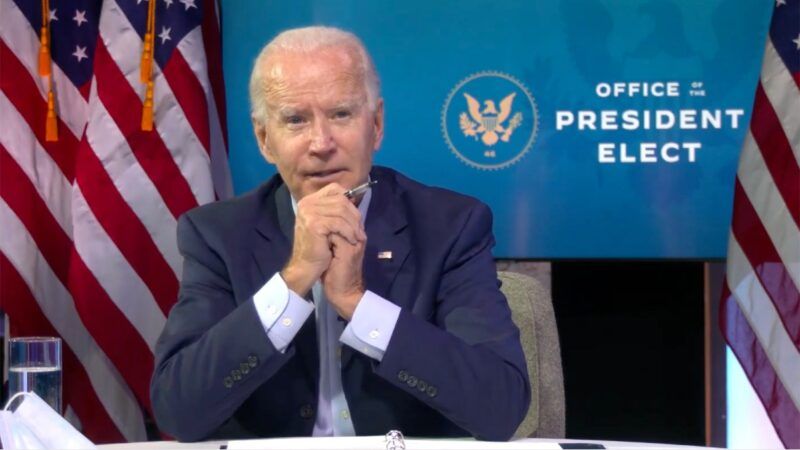If Biden Really Wants to Stimulate the Economy, He Should End Trump's Trade War
The current administration’s trade policies have left the incoming president some low-hanging fruit.

For President-elect Joe Biden, the $908 billion stimulus plan being debated in Congress is just a "down payment." Meanwhile, he's neglecting a measure that would significantly stimulate the economy without increasing government debt: ending President Donald Trump's trade war with China.
Trump will likely leave office with 25 percent tariffs still in place on nearly half of Chinese imports, along with a vague "deal" for China to buy $200 billion in unspecified U.S. goods. His ratcheting up of tariffs slowed the economy and failed to benefit even the industries he sought to protect. Lifting those trade barriers would almost certainly lead to growth.
Tariffs' impact is always difficult to measure, in part because their initial economic damage is dispersed among many people and in part because that damage reverberates through the economy. But most economists agree that the damage is severe. One study from the National Bureau of Economic Research found the recent round of tariffs associated with at least a 1 percent drop in overall employment.
What would happen if Biden unilaterally removed the tariffs against China? First, it would lower the tax burden by tens of billions of dollars on U.S. companies. Despite Trump's adamant insistence to the contrary, tariffs are charged directly on firms importing goods, and a piece of the relief from ending them would be passed down the supply chain to consumers.
Ending the tariffs would also be good news for U.S. exporters. China retaliated against U.S. protectionism by slapping hundreds of billions of dollars in tariffs on American automobiles and other goods. There's no good reason to think they would keep those tariffs in place if the U.S. acted first or as part of good-faith negotiations.
The economic benefits of removing the tariffs would not be limited to those directly buying and selling goods crossing the Pacific. Tariffs are taxes, and taxes distort economic activity. With these distortions removed, the market process would allocate resources between domestic and foreign activity far better than the president's boardroom scare tactics.
The optics of ending Trump's tariffs would also be positive. In a year when national borders have shut down and mistrust has festered, decisively pushing for free trade would show the world that American firms are open for business as the pandemic wanes.
Unfortunately, Biden's tepid position on trade emphasizes getting the U.S. "back on the same page with our allies." Like Trump, when he hears the phrase international trade he imagines world leaders sitting across chess boards, not transactions between billions of people who happen to live in different countries.
But the benefits of ending Trump's trade wars would be significant, and they would sidestep the usual spending and debt debates. (Economists fiercely debate whether and when the government can kickstart a sputtering economy through increased spending, but few ideas in the field come closer to unanimity than the benefits of free trade.) Trump's trade policies have left Biden some low-hanging fruit when it comes to getting the economy going again. If these tariffs persist, we'll have both presidents to blame.


Show Comments (150)